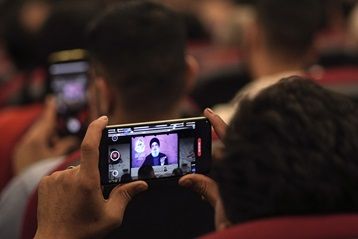Coded messages. Landline phones. Pagers. Following the killing of senior commanders in targeted Israeli airstrikes, the Iran-backed Lebanese terror group Hezbollah has been using some low-tech strategies to try to evade its foe’s sophisticated surveillance technology, informed sources told Reuters.
It has also been using its own tech — drones — to study and attack Israel’s intelligence-gathering capabilities in what Hezbollah’s leader Hassan Nasrallah has described as a strategy of “blinding” Israel.
The sides have been trading fire since October 8, one day after Hezbollah’s ally in Gaza, Hamas, launched a deadly terror assault on Israel, slaughtering some 1,200 people, seizing 251 hostages and triggering an ongoing war in the Gaza Strip. While the fighting on Lebanon’s southern border has remained relatively contained, stepped-up attacks in recent weeks have intensified concern it could spiral into a full-scale war
Tens of thousands of people have fled both sides of the border. Ten civilians have been killed on the Israeli side, as well as 16 Israel Defense Forces soldiers and reservists. Hezbollah has named 364 members who have been killed by Israel, and 65 operatives from other terror groups have also been killed, as well as dozens of civilians.
Many of Hezbollah’s casualties were killed while close to the border amid the near-daily hostilities, which have included launching rockets and explosive drones into northern Israel, but the terror group has also confirmed the deaths of more than 20 operatives — including three top commanders, members of its elite Radwan special forces unit and intelligence operatives — in targeted strikes away from the frontlines.
Israel’s electronic eavesdropping, including hacking into cell phones and computers, is also widely regarded as among the world’s most sophisticated. Hezbollah has learned from its losses and adapted its tactics in response, six sources familiar with the group’s operations told Reuters, speaking on condition of anonymity to discuss sensitive security matters.
Cellphones, which can be used to track a user’s location, have been banned from the battlefield in favour of more old-fashioned communication means, including pagers and couriers who deliver verbal messages in person, two of the sources said
Hezbollah has also been using a private, fixed-line telecommunications network dating back to the early 2000s, three sources said. In case conversations are overheard, code words are used for weapons and meeting sites, according to another source familiar with the group’s logistics. These are updated nearly daily and delivered to units via couriers, the source said.
Security experts say some low-tech countermeasures can be quite effective against high-tech spying. One of the ways that former al-Qaeda leader Osama bin Laden evaded capture for nearly a decade was by disconnecting from the internet and phone services, and using couriers instead.








